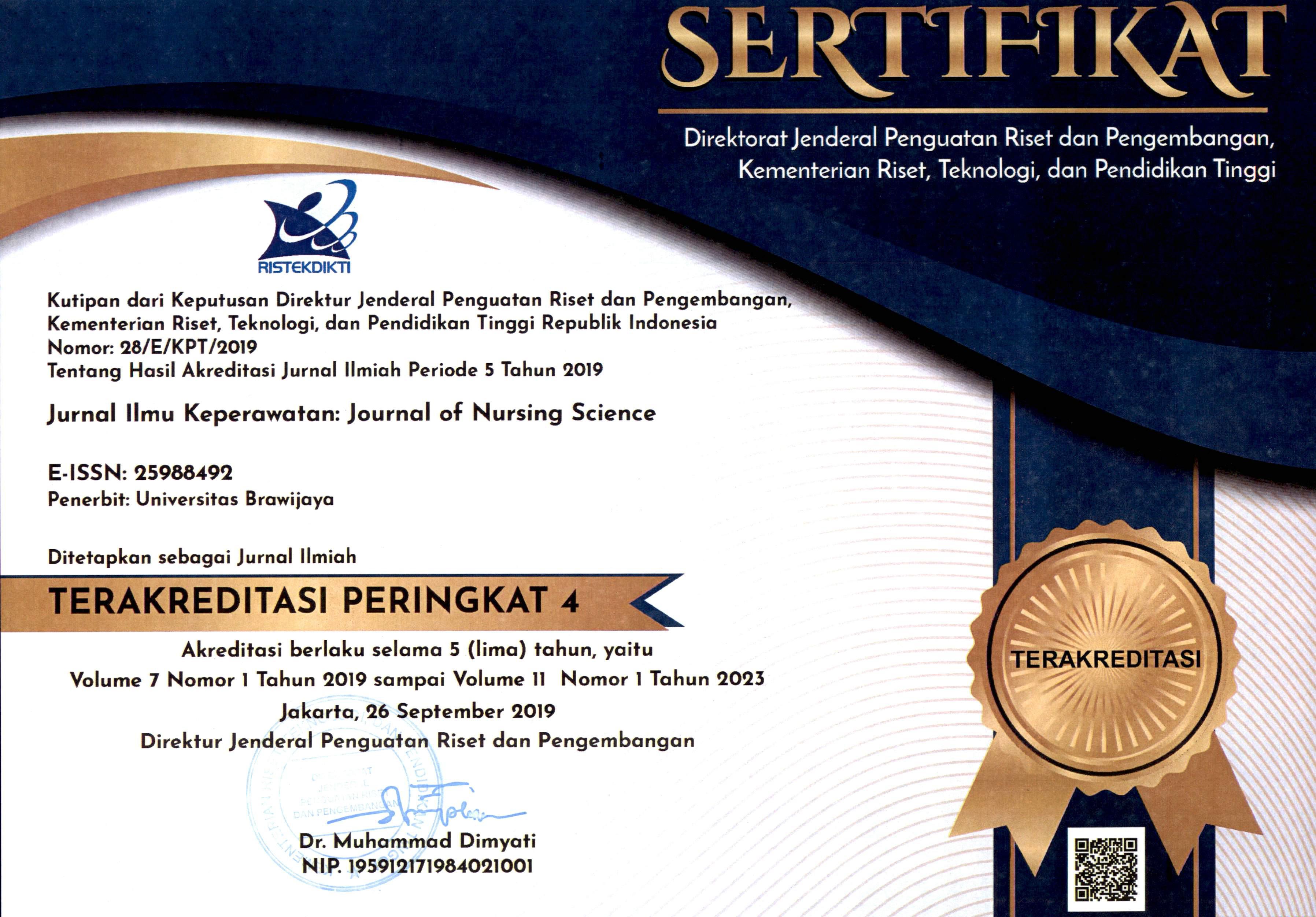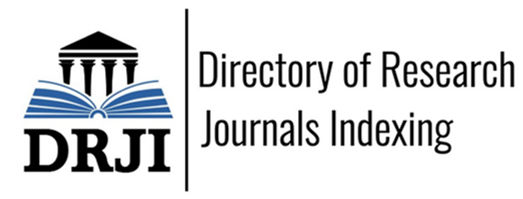THE INFLUENCE OF DANGDUT MUSIC TO THE BEHAVIOR OF CHILDREN SCHOOL AGE YEAR IN INDONESIA: A LITERATURE REVIEW
DOI:
https://doi.org/10.21776/ub.jik.2019.007.01.4Keywords:
Dangdut Music, Behavior Deviations, School Age YearAbstract
Dangdut music is popular music for some people in Indonesia, especially those from the middle-low socioeconomic group, popular not only for adults but also children, sometimes the lyrics for adults are accompanied by unrestricted visual effects watched by children. The aimed of this study was to the reviewing literature related to the influence of dangdut music on deviations in child behavior.
Searching for literature on databases in ProQuest, DOAJ, EBSCO, Pubmed, IPI Google School and Google Education with a range from 2013 to 2017. Using keywords "dangdut music", "behavioral irregularities", "school age children", and 1534 articles were found, in the second phase of the search adding criteria, namely not in autism / mental disorder children and not therapy, obtained 6 journals, in the third stage after reading abstracts and full text, the final results of the 6 journals were obtained. The reviewed journals mentioned that many dangdut song lyrics are meaningful and lead to impoliteness to be heard by school-age children that influence their behavior. Deviations that occur include children mocking friends or parents by behaving imitating the movements of dangdut singers, the development of the language of children who have been influenced by negative vocabulary and improperly spoken by children, children are also more emotional and lacking in religious awareness. In conclusion the influence of dangdut music exposure on behavior deviations in children. With the exposure of dangdut songs to affect children's language style when talking to parents with the pronunciation of vocabulary with negative connotations, children tend to be emotional, attitude when communicating with people who show irreverent ridicule, namely behavior that twists and turns on their bodies. School-age children are childhood times mimicking what he sees, as parents are obliged to play songs that are appropriate, so that children can grow and develop according to their age well.
References
- Afrinda. 2016. SARKASME Dalam LIRIK LAGU DANGDUT KEKINIAN (KAJIAN SEMANTIK). Jurnal Gramatika Vol 2, No 2 (2016).STKIP PGRI Sumatera Barat.http://ejournal.stkip-pgri-sumbar.ac.id/index.php/jurnal-gramatika/article/view/1040. Diakses pada tanggal :12/12/2017
- Antoro dkk.2013. Fenomena Lagu Dangdut Dewasa Di SD Negeri Tamansari
- Yogyakarta. Diperoleh dari :http://repository.upy.ac.id/1264/1/27.dwiantoro,Rosalia,SusilaPurwanti.pdf. Diakses pada tanggal :4/12/2017
- Hidayah.2012. Kebiasaan Mendengarkan Lagu-Lagu Bertema Dewasa Dan Menonton Sinetrn Dewasa Pengaruhnya Terhadap Perilaku Anak DI MI Ma’arif Global Blotongan Salatiga Tahun Pelajaran 2011/2012. Diperoleh dari :http://perpus.iainsalatiga.ac.id/docfiles/fulltext/99409805ea0bd5cb.pdf.Diakses pada tanggal :26/12/2017
- Iman Hardiana. (2016, April 30). Lagu Lagu Dangdut Berjudul Vulgar ini
- Dilarang Diputar di Jabar.Retrieved from Merdeka.com: http://www. merdeka.com /peristiwa/lagu-lagu-dangdut-berjudul-vulgar-ini-dilarangdiputar-di-jabar .htm
- Kurniasari dkk. 2014. Remaja Dan Musik Dangdut (Receiption Studies Musik Dangdut di Kalangan Remaja. Diperoleh dari :https://journal.ubm.ac.id/index.php/semiotika/article/view/6. Diakses pada tanggal :12/12/2017
- Sunarto dan Agung Hartono.(2013). Perkembangan Peserta Didik.Jakarta: Rineka Cipta.
- Susari. 2017. Fenomena Pemajanan Lagu Dangdut Berlirik Seronok
- Pada Perkembangan Imitasi Bahasa Anak (Kajian Sosiolinguistik dalam Konteks Kesantunan Berbahasa). Diperoleh dari :http://e-journal.unipma.ac.id/index.php./JPAUD/article/viewFile/1024/910. Diakses pada tanggal :12/12/2017
- Syamsu Yusuf. (2015). Psikologi Perkembangan Anak dan Remaja.Bandung: Remaja Rosdakarya.
- Rizal. 2016. Interpretasi Pesan Dalam Lirik Sebagai Perilaku Terbuka (Studi Pada Orangtua Tentang Perilaku Anak-anak Setelah Senam Diiringi Lagu Remix Dangdut Vulgar Di Superindo Kecamatan Mergangsan Yogyakarta. Diperoleh dari :http://digilib.uin.suka.ac.id/24948/1/11730064_BAB-1_IVatau-V_DAFTAR-PUSTAKA.pdf. Diakses pada tanggal :26/12/2017
- Widyatama,sila. 2013. Sejarah musik dan apresiasi seni di
- Asia. Balai pustaka : Jakarta Timur
- Wiradharma. 2013. Seksualitas Dalam Lirik Lagu Dangdut
- (Analisis Makna Metafora). Diperoleh dari :http://susatrafib.wphost2.ui.ac.id/wp-content/uploads/81/2017-makalah-gunawan-w-makalah-semnas-sosiologi-sastra-pro,pdf. Diakses pada tanggal :4/12/2017
- Wiwin, 2016.Pengaruh Musik Dangdut Koplo Terhadap Psikologis dan Perilaku Anak. Diperoleh dari :http://kakwiwin.blogspot.co.id/2016/12/pengaruh-musik-dangdut-koplo-terhdap.html.
Downloads
Published
How to Cite
License
Authors published in this journal agree to the following terms:
1. The copyright of the received article shall be assigned to the journal as the publisher of the journal. The intended copyright includes the right to publish the article in various forms (including reprints). The journal maintains the publishing rights to the published articles.
2. Authors may enter into separate additional contractual agreements for the non-exclusive distribution of the published journal version of the work (for example, posting it to an institutional repository or publishing it in a book), with acknowledgment of their initial publication in this journal.
3. Authors are permitted and encouraged to post their work online (e.g. in an Institutional Repository or on their website) before and during the submission process, as this can result in a productive exchange, as well as earlier and larger citations of the published work.
4. Articles and all related material published are distributed under Creative Commons Attribution-NonCommercial 4.0 International License or CC BY-NC 4.0 license.
JNSU is licensed under a Creative Commons Attribution-NonCommercial 4.0 International License or CC BY-NC 4.0 license.
Most read articles by the same author(s)
- Maria Julieta Esperanca Naibili, Iman Permana, EFFECTIVENESS OF MINDFULNESS-BASED COGNITIVE THERAPY (MBCT) TOWARDS DEPRESSION , Journal of Nursing Science Update (JNSU): Vol. 8 No. 1 (2020)





























